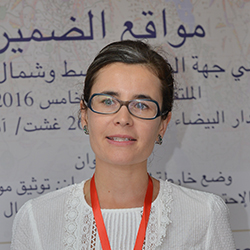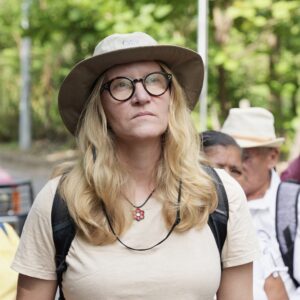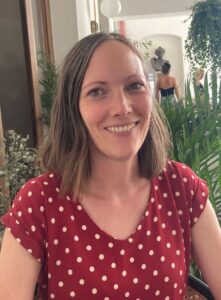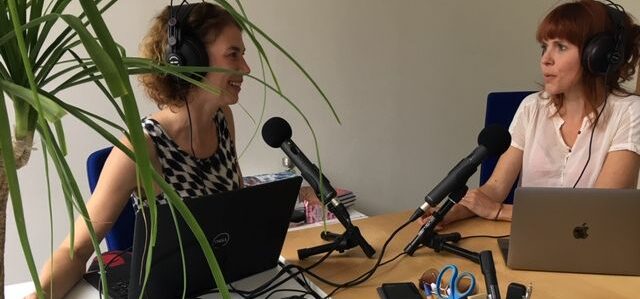July 16, 2024
Re-imagining Memorialization and Documentation in Afghanistan
The new miniseries of the Justice Visions podcast focuses on the current debates and discussions surrounding memory and memorialization. In this third episode of the miniseries, we shed a light on memorialization and documentation efforts in Afghanistan, and reflect on the merits of arts-based approaches, as well as the challenges posed by such approaches.
Sophia Bijleveld Milosevic is a member of AHRDO, an Afghan human rights organization that uses a transformative, victim-oriented approach. Their work aims to document human rights violations for judicial purposes while also telling victims’ stories in a way that reflects their lived experiences, among others via art-based approaches. Through the Memory Box initiative, AHRDO collected over 15.000 personal items of war victims, creating a space for individual and collective memorialization in Afghanistan. “We felt it was important to continue to share these testimonies and to continue to advocate for victims”, states Sophia. “In the Afghan context, memorialization can be considered as a form of symbolic reparation and a way of acknowledging the stories of the victims.” To leverage their expertise in documentation, and launch an online platform, AHRDO partnered with HURIDOCS.
HURIDOCS is an organization specializing in archival and documentation practices in the domain of human Rights. Its documentalist, Bono Olgado talks about how the victim-centred and arts-based practices of AHRDO challenged his organization to revisit its existing archival practice, and how memory and memorialization are understood. “When we are talking about creating a platform or a database that would reflect these art-based approaches, then we would need a different form of expertise, which is quite challenging because we’re technically creating counter-epistemologies to existing practises of documentation.” Initiatives such as the Memory Box and art-based methodologies, Bono stresses, reconfigure our understanding of documentation and data. “The challenge is to design technologies that actually support this new set of methodologies as opposed to flattening them.”

Benedict Salazar Olgado (Bono) is an archivist, scholar, and community organizer, working at the intersections of documentation, technology, and human rights in the Global South. He is the senior documentalist at HURIDOCS, assisting human rights groups with their documentation and technological needs. Bono is also an Assistant Professor at the University of the Philippines School of Library and Information Studies, teaching archival theory and practice. He received his PhD in Informatics with a Global Studies emphasis from the University of California, Irvine, and an MA in Moving Image Archiving and Preservation from NYU. His current research focuses on the datafication of memory politics in TJ.

Sophia Milosevic Bijleveld leads the Memorialization and Transitional Justice Program at the Afghanistan Human Rights and Democracy Organisation. Formerly the Global Networks Program Director at the International Coalition of Sites of Conscience, she has extensive experience with cultural heritage and transitional justice initiatives in Switzerland, Afghanistan, Rwanda, and Kenya. With a PhD in political science, her research explores the political use of cultural heritage and the dynamics of memory politics in post-conflict settings. Dr. Milosevic Bijleveld’s work includes numerous publications on memorialization’s role in transitional justice.
June 28, 2024
Stitching Memories: Embroidery in Shatila
The new miniseries of the Justice Visions podcast focuses on the current debates and discussions surrounding memory and memorialization. In this second episode of these miniseries, we shed a light on memorialization efforts through embroidery practices in Shatila camp in Beirut. Since the increasing repression by the Assad regime and the war in Syria, there has been a large influx of refugees into Shatila, originally a Palestinian refugee camp.
Our colleague Sofie Verclyte recently defended her PhD project ‘Migrating heritage’, and developed a co-creative project with women in Shatila. In that project, she explored the role of embroidery practices in the context of conflict and displacement. Tine De Strooper and Brigitte Herremans spoke to Sofie about the practice of embroidery, and how it has been used in the Syrian context, as a way to remember, and an important element in the broader struggle for justice.
While embroidery might not seem directly reconcilable with a struggle for justice, it has a long history of narrating lived experiences. There are many instances where practitioners use their skill to remember and transmit lived experiences of harm. As Sofie highlights: “this is also the case in Shatila, where embroidery, rooted in the region’s rich textile tradition, plays a central role in the lives of makers, typically women.” Traditionally, these women often passed down their craft through intergenerational mentorship, often as a form of storytelling. As such, embroidery is a way to transmit knowledge, to express lived experiences, and therefore a way to transmit memories and to prevent forgetting.
As Boushra, one of the artists with whom Sofie worked states: “For me, embroidery is a revival of memory. It prevents me from forgetting the experiences I went through, such as war, displacement and being a refugee. Often experiences are harsh, whether due to war, displacement, or life circumstances.” Boushra emphasizes that she sees embroidery as a form of communication, a language for sharing experiences. This perspective highlights the significance of nonverbal practices in capturing and conveying experiences of harm.
In a context where formal memorialization initiatives are absent because of the ongoing injustices and the context of the entrenched non-transition, informal memorialization efforts can be seen as a way to express, share, and resist memories of injustice. These private practices preserve unarchived and previously unrecorded memories, but also, and often simultaneously, they make it possible to imagine a more just future.
Copyright picture: Aaron Lapeirre

Sofie Verclyte is a researcher at the HOGENT School of Arts and Justice Visions. She obtained an interdisciplinary PhD in Law and Arts: Visual arts with her research Migrating Heritage. Her work, situated at the crossroads of design and legal anthropology, explores artistic and skilled practices in the context of conflict and displacement. Specifically, she examines the unique role of embroidery practices as a means of storytelling in the domain on (in)justice, and how artistic practices can be a way to engage about these topics. Prior to her research, she worked with refugee minors in an Orientation and Observation Centre of Fedasil and obtained a master’s degree in fashion design and a postgraduate master conflict and development studies.
June 14, 2024
Memorialization from below in Guatemala and El Salvador
The latest miniseries of the Justice Visions podcast focuses on the current debates and discussions surrounding memorialization as the fifth pillar of transitional justice. The miniseries foreground innovative grassroots memorialization efforts from a wide array of contexts dealing with impunity, revisionism and lack of political will. This episode focuses on the vibrant memorialization landscape in Guatemala and El Salvador where victims-survivors and civil society organizations are actively constructing memory and dignifying the victims after mass atrocity.
In this episode, Prof. Tine Destrooper brings into conversation Gretel Mejía Bonifazi and Prof. Amanda Grzyb, about working together with victims-survivors to undertake memorialization efforts in Guatemala and El Salvador respectively. Amanda discusses the Surviving Memory in Postwar El Salvador project, which applies a participative methodology involving documentation, research and commemoration initiatives that “reject an extractive model of research and focus instead on public facing projects… and that aim to recognize how community-based research and co-creation can count as research”.
In the same vein, Gretel talks about the new research project that focuses on memorialization from below in the Ixil region. Gretel and Tine will work with Ixil survivors and grassroots actors who are currently mobilizing to create a Museum of Memory. The museum aims to both commemorate the victims of the genocide and to recover the cultural heritage of the Maya Ixil. In line with a participative and collaborative approach, the project looks at working with “victims-survivors according to their needs and worldviews, and to contribute to their ongoing memorialization efforts”.
According to local actors and partners, engaging in bottom-up memory collaborations holds great importance. For Felipe Tobar, a Salvadoran survivor and local founder of the Surviving Memory project, the significance of the project lies in “facilitating and strengthening the organization of all the survivors and relatives” who are now more involved in the different initiatives. It has allowed the communities to have access to “health programs and psychosocial attention for the first time, which has helped them to heal the wounds” and work for the non-repetition of human rights violations.
Guests:
Prof. Amanda F. Grzyb, is Professor of Information and Media Studies at Western University, where her primary teaching and research interests include state violence, genocide studies, social movements, and memory studies. Her edited books, articles, book chapters, public reports, and research-creation projects focus on Central America, Nazi-occupied Europe, Rwanda, and Sudan. Dr. Grzyb currently serves as the project director for Surviving Memory in Postwar El Salvador (a SSHRC and CFI-funded community-based research partnership committed to documenting the history of the Salvadoran Civil War and preventing future violence.

Felipe Tobar is a survivor of the Sumpul Massacre and the El Alto Massacre. During the war, 18 members of his family were murdered. Throughout the war, he was displaced with his family, fleeing in the mountains and suffering the inclement weather, hunger, diseases and the persecution of the repressive forces of the government until the signing of the Peace Agreements in 1992. Don Felipe is the President of the Board of Directors of Asociación Sumpul, an organization of massacre survivors in Chalatenango, and former mayor of San José Las Flores, Chalatenango, El Salvador. Felipe is one of the founders of the Surviving Memory project and a key collaborator on many sub-projects, such as the memorial at Las Aradas, the massacres map, workshops, testimonies, amongst other projects.

Voiceover: Luis de León Agosto
Cover photo: Las Aradas Memorial construction site, El Salvador (c) Surviving Memory in Postwar El Salvador
March 12, 2024
Driving Justice: Victims’ Participation and Mobilisation in Tunisia’s Struggles for Redress
Between 1956 and 2011, Tunisia endured decades of authoritarian rule under Presidents Habib Bourguiba and Zine El Abidine Ben Ali. The Tunisian Revolution in 2011 led to the ousting of Ben Ali and catalysed the start of the institutional transitional justice process. Yet, mobilisation against authoritarian rule and the curtailment of basic freedoms also predated the establishment of this formal process.
In this episode, our guests Houcine Bouchiba, Hamza Ben Nasr and Leila Bejaoui discuss how the participation and activism of victims, supported by victims’ organisations and civil society, profoundly shaped the transitional justice process in Tunisia. Survivors and activists have played a pivotal role in pushing for accountability, supporting truth-seeking, and advocating for reform – despite facing numerous obstacles and waning public and political will.
Houcine, Hamza and Leila speak to the realizations and setbacks of the Truth and Dignity Commission (IVD) and the Specialized Criminal Chambers, whilst illustrating the importance of foregrounding gendered harms and socio-economic demands (for employment, and livelihoods) in the Tunisian context.
At the same time, the events of July 2021 have caused widespread concern about the country’s transitional justice trajectory. This also prompted our guests to reflect on how the current reality affects victims’ experiences and trajectories, and how it pushes victims’ organisations and civil society to reorganize in order to revitalize justice efforts and resist autocratization.
This episode was realized in collaboration with Avocats Sans Frontières (Lawyers Without Borders), Tunis branch.
Information about the speakers:
Houcine Bouchiba is a human rights activist, transitional justice expert and former president of the Al-Karama victims’ association. After the Tunisian revolution, he accompanied the transitional justice process from the very start and also acted as Secretary-General of the Tunisian Coalition for Transitional Justice.
Hamza Ben Nasr is Transitional Justice Coordinator at the Tunis office of the international NGO Lawyers Without Borders. He is also a coordinator of the Tunisian Coalition for Transitional Justice, a network of civil society organisations working to promote and defend the principles of transitional justice in the country.
Leila Bejaoui is a psychotherapist, member of the Al-Karama victims’ association and a feminist activist in various other civil society organisations.
January 17, 2024
Researching Survivors’ Participation in Colombia
The new season of the Justice Visions podcast focuses on issues surrounding victim participation, mobilization and resistance. It focuses on debates that will also be addressed during the upcoming Justice Visions conference, taking place 13-15 March 2024, in Ghent (Belgium) and online. In this episode, we talk about the methodological challenges of doing research on victims’ lived experiences of participation in and resistance against formal transitional justice processes.
Our studio guest is assistant professor Sanne Weber. Her research focuses on gender-just reparations in rural communities in Colombia’s Caribbean region, where survivors were engaged in the process of land restitution and collective reparations. In the episode we focus on participation in formal avenues, because, as Sanne argues, these continue to be of paramount importance for victims: “What is really important about the more formal processes is the recognition by the state, because eventually it’s the state’s responsibility to redress the harm and transform the situation. Even though informal or non-formal spaces are very important and can have very important goal of rebuilding social fabric and recreating trust.”
Yet, while her initial plan was to employ participatory research methods, she soon found that her potential research participants had limited interest in this approach, due to a “participation fatigue” which can be traced back to how the formal transitional justice process was organized. Colombia Victims’ law is often hailed for promoting innovative forms of victim participation, yet significant challenges have characterized its implementation. As Sanne argues, “Participation in this process had required a great investment of time and effort, but they weren’t seeing the results of their participation.”
This raises important questions for researchers in terms of how to navigate this scepticism regarding participatory methods, the power dynamics surrounding it, and the concrete strategies for foregrounding the voices of people who experienced violence. As Sanne underscores in the podcast, this is a trial and error process: “It is really a way of trying to overcome obstacles by sharing the power between participants and researchers. This has a long history in Latin America – this approach of combining research with activism and valuing grassroots knowledge.”
This episode on research methods lays the foundation for a next episode which focuses on the actual experience of survivors who participated in formal processes.





